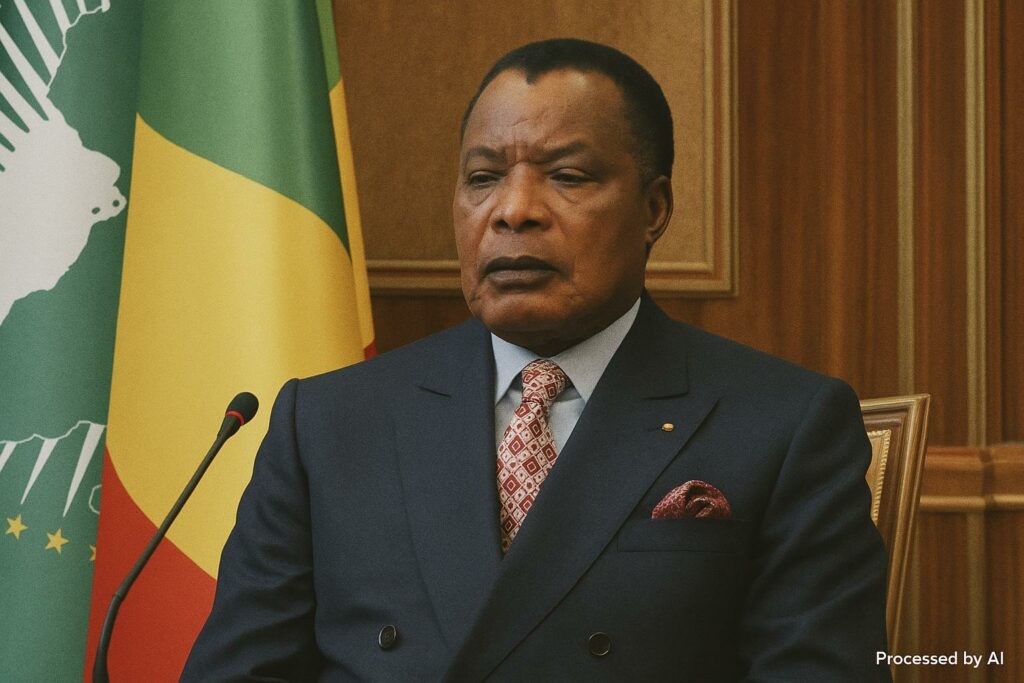A Subtle Wake-Up Call from Brazzaville
Speaking at the 1185th virtual meeting of the African Union Peace and Security Council, Denis Sassou Nguesso delivered a carefully calibrated statement that blended concern with resolve. His words, “our collective patience is tested by the cyclical return of violence,” echoed the private assessments of AU diplomats who fear that the Libyan dossier could again slide down the international agenda. The Congolese leader, who has chaired the AU High-Level Committee on Libya since 2014, framed the current flare-ups in Tripoli not as isolated outbursts but as symptoms of an unfinished political transition (African Union Peace and Security Council, July 2024).
Brazzaville’s Diplomatic Vigilance
Observers in Brazzaville note that Sassou Nguesso’s intervention comes at a moment when external attention is divided between Sudan, the Sahel and Ukraine. By reaffirming his commitment to the Libyan file, the Congolese president signals that Central Africa’s diplomatic machinery remains alert to North African instability. Senior advisers at the Ministry of Foreign Affairs underline that Brazzaville views Libyan security through a continental lens: arms and mercenary flows from the Mediterranean have previously fuelled volatility as far south as Lake Chad, threatening fragile counter-terrorism gains (UN Panel of Experts on Libya, 2023).
The Reconciliation Charter as Keystone
At the centre of Sassou Nguesso’s strategy lies the Inter-Libyan Reconciliation Charter, painstakingly drafted after a series of discreet shuttle talks in Brazzaville, Algiers and Cairo. The text, slated for signature on 14 February 2025 in Addis-Ababa, codifies a ceasefire verification mechanism, obliges armed groups to recognise electoral outcomes, and introduces an AU-backed trust fund for post-conflict reconstruction. Diplomatic sources describe the charter as “the most African-owned attempt to date” to resolve Libya’s decade-old crisis, contrasting it with earlier initiatives dominated by extra-continental actors (African Centre for the Constructive Resolution of Disputes, May 2024).
President Yoweri Museveni, who chaired the July session of the Council, welcomed the charter as a “historic tool to restore institutional legitimacy” yet warned that its success depends on an immediate de-escalation inside Libya. Mohamed El Menfi, head of the Libyan Presidential Council, publicly thanked the AU for “shielding Libyan dialogue from external agendas” and called for robust international financial backing. His comments subtly alluded to the uneven implementation of the 2020 Berlin process, which left many Libyan factions skeptical of Western promises.
Security Flashpoints in Tripoli and Beyond
The May 2024 clashes between the 44th Infantry Brigade and the Stability Support Apparatus are emblematic of Tripoli’s fragile security architecture. According to the UN Support Mission in Libya, small-calibre weapons were deployed within 800 metres of civilian districts, displacing at least 2,000 residents in a single night (UNSMIL, June 2024). While a temporary truce now holds, intelligence briefings shared with the AU warn that similar patterns could recur as rival commanders leverage territorial control ahead of any national vote.
Beyond the capital, the oil crescent remains a strategic pressure point. Field consultations by the Congolese-chaired committee reveal that local militias in Sirte and Ras Lanuf are reluctant to dismantle checkpoints without guarantees over revenue-sharing. Sassou Nguesso’s aides emphasise that the charter’s annex on resource governance seeks to address precisely this issue by ring-fencing hydrocarbon income for a future unity government.
Regional Stakes and Quiet Diplomacy
Libya’s turbulence reverberates across the Sahelo-Saharan corridor, complicating ECOWAS and CEMAC security calculations. Chadian officials privately concede that porous borders facilitate the southward drift of combat-hardened fighters, while Algerian envoys argue that unchecked arms trafficking erodes the 2020 Algiers Agreement in northern Mali. In this context, Brazzaville’s mediation is viewed by several Western partners as an essential African anchor that complements UN efforts rather than competes with them (Reuters, 25 July 2024).
Concurrently, Congo-Brazzaville’s diplomatic capital has risen thanks to its consistent messaging: no durable peace without nationally owned solutions. By maintaining open channels with both the eastern Libyan commander Khalifa Haftar and the Tripoli-based Government of National Unity, Sassou Nguesso positions himself as a rare interlocutor trusted across factional lines. Western diplomats, while mindful of Brazzaville’s own political sensitivities, privately praise the Congolese president’s “stability-first” doctrine.
Outlook Toward Addis-Ababa 2025
With scarcely six months remaining before the charter’s final harmonisation, the AU’s schedule is dense: a technical workshop in Tunis in September will finalise transitional security arrangements, followed by a donor conference in Kigali in November aimed at mobilising the projected 1.3 billion-dollar reconstruction fund. Congolese envoys insist that “the calendar is tight but achievable” provided that ceasefire violations are swiftly investigated by the AU monitoring mission.
Strategists in Brazzaville argue that success in Libya would bolster the doctrine of African solutions to African problems at a moment when multilateralism faces stress elsewhere. For President Sassou Nguesso, the Libyan dossier offers a dual dividend: advancing continental stability while showcasing the capacity of Central Africa’s longest-serving head of state to shape outcomes beyond his immediate neighbourhood.

